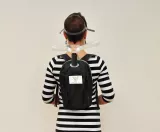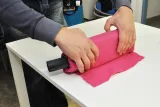Published: 28.06.2022
Scientists at the Centre for Materials and Nanotechnologies, Faculty of Chemical Technology, University of Pardubice, have developed a personal filter against SARS-CoV-19 that could find its application in developing countries. Fitting into a backpack, the entire assembly does not use nanomaterials but a commonly available polyester knitted fabric similar to a fleece blanket. The original solution of the Czech scientists has been published by PLOS One, the prestigious American professional journal.
The material used by the researchers is chemically and heat resistant, and unlike the non-woven fabrics used in respirators, it is also mechanically durable. The filter can be regenerated by boiling or washing at 95 °C. It does not lose its filtering capacity even when washed or boiled repeatedly. "Its high filtration capacity can be attributed to the soft layer, which resembles a non-woven fabric," emphasises the study's author, Ing. Max Fraenkl, Ph.D. at the Centre for Materials and Nanotechnologies, Faculty of Chemical Technology, University of Pardubice.
"Our chosen material has an excellent ratio between the amount of virus-aerosol it traps and the resistance it puts up when breathing. Therefore, it is comparable to the materials used in FFP3 respirators," says Max Fraenkl. He collaborated on the invention with the Institute of Chemical Process Fundamentals, the Academy of Sciences of the Czech Republic and the Textile Testing Institute in Brno.
The researchers used the material to assemble a filter cartridge that can be carried on the back in a small backpack. An independent test by the Occupational Safety Research Institute confirmed that the cartridge's filtration efficiency reached 99 per cent. "The filter backpack could be a good solution for developing countries or as equipment for doctors working in these countries," says Vladimír Ždímal, co-author of the study and head of the Department of Chemistry and Physics of Aerosols at the Institute of Chemical Processes, the Czech Academy of Sciences.




